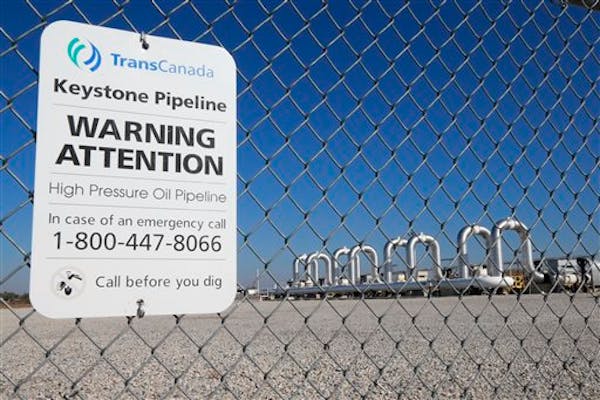The rejection of Keystone XL is a setback for North Dakota's oil industry, even though falling oil prices and the drop in Bakken drilling and oil production have lessened the immediate need for it.
"It is a good time to say 'No, we don't want a pipeline' when you really don't need it," said Rudy Hokanson, a Minnesota-based oil analyst for Barrington Research.
TransCanada's proposed 1,200-mile crude oil pipeline from Alberta through Montana and South Dakota to Nebraska would have carried mostly Canadian oil sands crude. The takeaway capacity of a planned Bakken leg was 100,000 barrels per day, just under 10 percent of North Dakota's current production.
But North Dakota officials believe that more Bakken pipelines still will be needed to carry future oil volumes.
"We will be talking to TransCanada and to others to understand how that need can be met," Justin Kringstad, director of the North Dakota Pipeline Authority, said in an interview.
Both Canadian and North Dakota oil producers are hurting because of persistent low crude oil prices. On Friday, North Dakota reported just 64 active drilling rigs, a 71 percent drop from the peak in May 2012. North Dakota's production fell 1.7 percent in August in the latest decline since peaking last December.
Kringstad said Keystone XL was one of four proposed pipelines intended to boost the state's pipeline capacity. Nearly half of that state's crude oil is shipped by rail, much of it on long oil trains that pass through Minnesota cities, including Minneapolis and St. Paul.
Two proposed projects to transport North Dakota oil are under regulatory review — Enbridge Energy's Sandpiper pipeline across North Dakota and Minnesota and Energy Transfer Partners' Dakota Access line via South Dakota and Iowa.
Those projects, as well as Enbridge's separate plans to replace and expand another Canadian oil sands pipeline through Minnesota, are facing opposition from an anti-pipeline activists who cheered President Obama's decision Friday on Keystone XL.
"We hope this decision will call attention to whether we will allow the massive expansions of especially tar sands oil to be piped through our state," said Margaret Levin, state director of the Sierra Club North Star Chapter.
Frank Bibeau, an attorney for Honor the Earth, an environmental group led by Native Americans, said Minnesota now "will become the next important focus" of the anti-pipeline movement.
Enbridge reacted to opponents' suggestion that Minnesota is the next ground zero for U.S. pipeline opponents.
"Conversation about pipeline and other infrastructure projects is healthy," Enbridge spokeswoman Lorraine Little said by e-mail. "Support for Enbridge's pipeline projects in Minnesota is growing. This is evidenced by the fact that 96 percent of landowners have signed easement agreements along the Sandpiper pipeline route and sixty five Minnesota legislators, the majority of the county commissions along the route, dozens of chambers of commerce and farm bureaus and thousands of citizens have adopted resolutions or written letters of support for Sandpiper."
One worrisome alternative to Keystone XL — an increase in oil trains from Canada through Minnesota — is not playing out. Canadian crude exports by rail have dropped by half in the past year after peaking at 165,200 barrels per day in the third quarter of 2014, according to Canada's National Energy Board.
"Rail has never been a serious alternative to Keystone XL," said Rep. Frank Hornstein, DFL-Minneapolis, who has worked on crude-by-rail safety issues. "That has been a talking point for pipeline advocates. It is not based on reality."
David Shaffer • 612-673-7090 Twitter: @ShafferStrib

